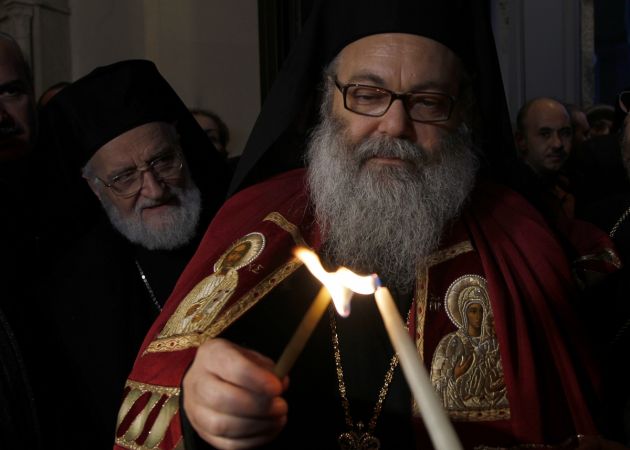Syrian clerics still held despite interfaith, UN condemnations

Two Syrian Christian bishops abducted by gunmen outside the besieged city of Aleppo on April 22 remain in their captors' hands despite calls that they should not be harmed and be released, and the condemnation of the kidnappings by all faiths.
Eastern Catholic clergy celebrated a Mass in Rome's Basilica of Santa Maria in Cosmedin on May 11 to pray for two archbishops and two priests who remain the hostages of rebels in Syria, the Catholic News Agency reported.
A global grouping of a wide range of Christians that includes Evangelicals, Orthodox, traditional Protestants, Pentecostals and Roman Catholics along with the World Council of Churches and a European church grouping have expressed their distress after the abduction of two senior Orthodox bishops in Syria while they were doing humanitarian work.
The office of United Nations High Commissioner for Human Rights, Navi Pillay, joined church leaders in condemning the kidnappings.
Archbishop Yohanna Ibrahim of the Syriac Orthodox Archdiocese of Aleppo and Archbishop Boulos Yazaji of the Greek Orthodox Church of Aleppo are the two bishops who were kidnapped along the border with Turkey.
Archimandrite Mtanious Haddad, rector of the Greek Melkite Catholic Basilica, told CNA / EWTN News there are "so many" people who have been kidnapped.
"Our Mass today was to pray for all those Christians and moderate Muslims who have been kidnapped," said Fr. Haddad.
The news agency quoted Haddad saying the rebels "want to show that there is no more coexistence between Christians and Muslims but this isn't true." He said the rebels are "trying to show there is a problem between Christians and Muslims in Syria when there isn't and there never has been."
CNA reported that the captured bishops are still being held in a village northwest of Aleppo.
Gunmen pulled the two Christian archbishops out of their car and shot their driver, a deacon.
They were on their way to Aleppo from the Turkish border in an effort to negotiate the release of two priests, Armenian Catholic Father Michel Kayyal and Father Maher Mahfouz, a Greek Orthodox Christian.
The priests had been abducted on Feb. 9 when the bus they were riding on from Aleppo to Damascus was stopped. They are still being held captive.
The Lebanese Ambassador to the Holy See, Georges El Khoury, attended the May 11 Eucharistic ceremony as did as the Iraqi Ambassador to the Holy See, Habeeb Al-Sadr, Muslim.
The European Council of Religious Leaders has also strongly condemned the still unresolved kidnapping of two prominent Christian leaders of Aleppo, Syria saying it is an affront to all faiths.
The U.N. Human Rights Commissioner, Navi Pillay, while not referring specifically to the cases of the abducted clerics and condemning mainly government atrocities against civilians has denounced abductions by opposition fighters.
The attack on Syria's clergy represents not only an attack on Christianity but an attack on all of humanity and the potential for peace, the religious leaders council said in a statement released May 10 after its May 7 to 8 meeting in Vienna.
"The incident took place in the village of Kfar Dael, where both clerics were engaged in humanitarian work. They were both known for their preaching inter-religious peace and reconciliation," said the council in the statement following its May 7 to meeting in Vienna, Austria.
'The ECRL emphatically calls on all faiths to condemn this unprovoked act.
"All laws, values and principles reject the use of violence and coercion for the achievement of any goals," said the statement.
"The world must act to free the two religious leaders, to free the nation from violence and suffering."
The European Council of Religious Leaders is one of five regional interreligious councils within the Religions for Peace network.
The European Council of Religious Leaders brings together senior religious leaders from Europe's historical religions: Judaism, Christianity and Islam together with Buddhists, Hindus, Sikhs and Zoroastrians.
The Council was founded in Oslo in 2002. The Council is funded by its members and has received project support from The Norwegian Ministry of Foreign Affairs.
Religions for Peace is a network of national and regional Interreligious Councils (IRC) connected through an international World Council and Secretariat, based in New York. The global organisation brings together 70 national and 5 regional IRCs.
In a statement on May 10 U.N. human rights chief Pillay said, "Recent reports suggest, for example that some anti-Government armed groups have been operating and hiding within densely populated areas, thereby seriously endangering civilians, she said.
She also noted, "Abductions and the taking of hostages by some armed opposition groups, including Jabhat Al Nusra, are also reported to be increasing." Pillay added, "The plight of Syrian women and girls is a particular concern to me, including recent allegations that some fighters are engaging in forced marriages."